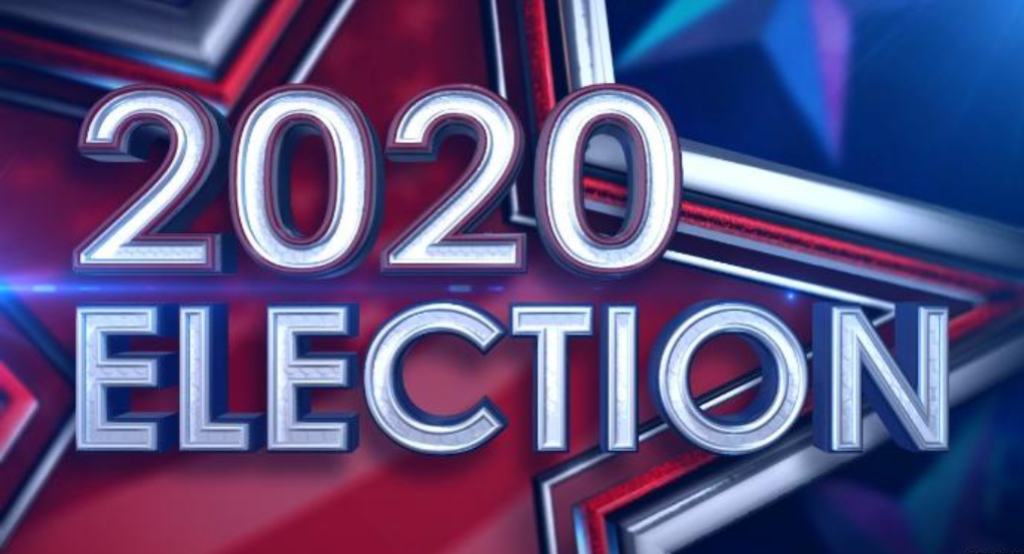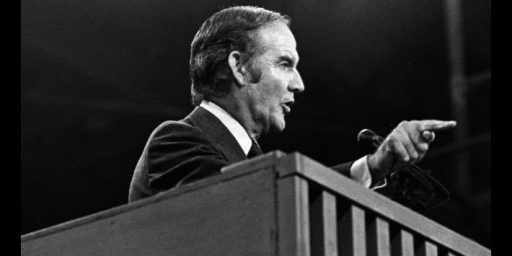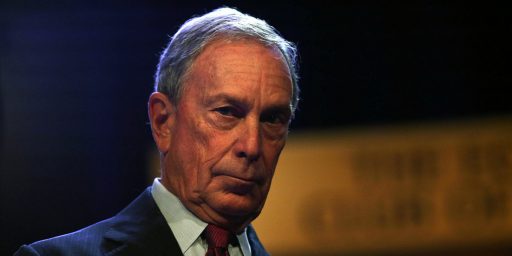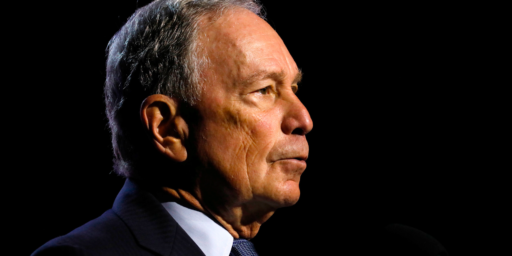Late-Entering Presidential Candidates Rarely Win
History shows us that candidates who enter the race for President late rarely do well, and rarely manage to win.

With both Michael Bloomberg and Deval Parick apparently considering late entries into the Presidential race, Jeff Greenfield notes in a piece at Politico that late-entry candidates such as these potential candidates rarely succeed in Presidential races:
If Michael Bloomberg is looking for evidence that a late entrant can win a presidential nomination, all he has to do is look back. About seven decades.
It happened in 1952, when Illinois Gov. Adlai Stevenson—after repeatedly refusing President Harry Truman’s requests to jump into the race as Truman’s Democratic successor—waited until the convention began to declare himself a candidate. Stevenson gave an acclaimed welcoming speech to delegates in Chicago, changed his mind, and won the nomination on the third ballot.
Bloomberg’s surprise late entry into the 2020 race is a familiar story: The candidate who casts himself in the role of The Savior Who Is Waiting in the Wings is a quadrennial feature of presidential campaigns. For decades, Democrats and Republicans alike have persisted in looking beyond the field of those desperate few who have spent months, if not years, racking up frequent flier miles; eating indigestible food; begging for money; and crowding into coffee shops, union halls and living rooms trying to build a constituency. Right around this time of the cycle, these voters and pundits and party operatives reliably hit the panic button, certain that somewhere above the fray stands a candidate free of the now-obvious flaws that burden the rest of the field. It’s a yearning that invites comparison to the Groucho Marx quip about refusing to join any club that would have him as a member: “I refuse to support any candidate who overtly is seeking my vote.”
There’s one pesky fact about these late-entry candidacies: They never succeed. Only once have they even materially affected the outcome of a fight for the nomination.
Stevenson’s success—and he didn’t even win the presidency—came at a radically different time in American politics. In 1952, virtually no delegates were chosen in primaries; the party’s power brokers and bosses came to conventions with the ability to actually decide who the candidate would be—in a smoke-filled room, if necessary. We are in a different political universe today, and have been for the better part of 50 years.
Once primaries became the path to the nomination, a Stevenson-like delay stopped being a plausible strategy for victory. No late entrant has won a nomination since 1952. The most any latecomer has accomplished is to deliver victory to another contender. Campaign after campaign, these Mighty Mouse-like champions proclaim, “Here I come to save the day!” only to discover that their party doesn’t seem to want their rescue skills after all. The bracing tonic they seem to offer turns out to be a sugar rush.
Greenfield, who is primarily a political historian, cites two more examples from the era before primaries became the predominant method by which the two major parties pick their nominees, and neither one of them was successful in the sense that Stevenson was in winning the support of his party in a year when Democrats seemed to realize that winning against a Republican candidate like Dwight Eisenhower was going to be next to impossible no matter who the nominee might have been. The first such example is Lyndon Johnson, who spent much of 1960 dithering about entering the race for the Democratic nomination and ultimately did not do so until the convention itself. Being the only prominent candidate from the South made Johnson a strong candidate, and ultimately Vice-President, but it didn’t put him close to a nomination that John F. Kennedy had largely sewn up. Similarly, eight years later, Ronald Reagan, who at the time was just a year into his service as California’s Governor, entered the race for the Republican nomination on the opening day of the 1968 convention in Miami Beach. Ultimately, Reagan came in third behind Richard Nixon and Nelson Rockefeller
During the modern era that began roughly in 1972 with the race for the Democratic nomination, the record of late-entry candidates is even more dismal:
- In 1972, former Vice-President and Senator Hubert Humphrey entered the race for the Democratic nomination in the wake of signs that the campaign of Senator Ed Muskie was falling apart. Humphrey’s entry came too late to participate in the race in either New Hampshire or Iowa. However, when Muskie’s campaign ultimately did collapse he ended up being the principal alternative to George McGovern, who was the favored candidate of the anti-war movement and other left-leaning segments of the party. During the campaign, Humphrey was able to inflict significant damage on McGovern that would follow him to the General Election and also led to particularly chaotic Democratic National Convention that ended with a weakened McGovern facing an uphill race against a popular incumbent;
- In 1976, California Governor Jerry Brown entered the race for the Democratic nomination in March 1976, in part at the urging of party power brokers who had serious doubts about apparent front-runner Georgia Governor Jimmy Carter. Brown did well in a handful of primaries but in the end, came up far too short in the delegate count to seriously challenge Carter at the convention;
- In 1988, former Colorado Senator Gary Hart, who had dropped out of the race early after a sex scandal, reentered the race by “unsuspending” his campaign in December 1987. While early polling suggested that Hart was a strong contender for the nomination, he ended up finishing in the single digits in both Iowa and New Hampshire and in the Super Tuesday states. After that Hart, who had been an upstart rival to former Vice-President and 1984 Democratic nominee Walter Mondale;
- In 2004, retired General Wesley Clark entered the race in September 2003 but his campaign ultimately fizzled in no small part due to answer to questions about the ongoing Iraq War that placed Clark at odds with most of the Democratic base;
- Finally, in 2008 former Senator Fred Thompson left his job as one of the stars of Law & Order to enter the race for the Republican nomination in September 2007. While he enjoyed the support of many conservatives looking for a strong challenger to John McCain, Thompson’s lackadaisical campaign-style meant that his campaign never really took off. As Greenfeld notes, though, he did impact the outcome of the race by sufficiently splitting the vote in South Carolina to give McCain a narrow win that effectively was the beginning of the end of the race for the GOP nomination. Three days after finishing third in South Carolina, Thompson dropped out of the race.
In the modern era at least, it’s easy to understand why late-entrants are unlikely to do well. The candidates who are in the race now have spent the better part of a year introducing themselves to the public, fundraising, hiring campaign staff and assembling a volunteer network, talking to voters in the early primary states, and participating in nationally televised debates. The idea of a “savior” candidate stepping into the race now without having done any of that seems to be a far-fetched idea that has little chance of succeeding. This is especially true of candidates such as Bloomberg, who is not exactly getting a welcome reception in the initial polling after last week’s news, and Patrick, who clearly doesn’t have the national name recognition that Bloomberg does, in this cycle. Absent some development in the race that causes more than one of the top candidates to utterly collapse in a short period of time, it’s unlikely that history would be any different this time around.




Thanks, Doug. That was useful.
BTW, Thompson ran for the Republican slot, not the Democratic. Although context makes clear what you meant.
“Butbutbutbut I am the chosen one!”
Best thing for Bloomberg and whoever’s bankrolling Patrick to do is save their money to support the eventual nominee in the General.
When I hear “Here I come to save the day!” I think of Andy Kaufman doing Mighty Mouse 🙂
IMO, what happens is people get tired of the same candidates month in and month out, and would like to see someone different. When someone new arrives, there’s a novelty factor and name recognition. Then people realize the new candidate isn’t much different from the old ones, and lose interest or lump them with the rest of the field.
The bottom line with all of this is who can beat Trump…that literally is the most important thing…if Patrick has a better shot than others at achieving that, then he should get some consideration…
I will accrue as many EC votes as Bloomberg. Which is zero.
Rich people, as a class, think they’re special. Deserve special dispensation. You do not. You are poorly served by your flacks.
@An Interested Party:
You are overthinking this.
This is 2008 redux.
Any semi-competent D beats Trump by a mile.
With the way that Warren would be demonized? And the amount of misogyny in this country? And how scared Wall Street is of her? You are overly optimistic…
@An Interested Party:
You underestimate how hard Trump is disdained.
Look at his negatives.
Dude cannot win. He’ll get 45% of the vote. Good job, loser! You rallied the faithful. That is the lamest achievement. You do realize you have to grow your supporters, yes?
In 2020 Trump peaks at 45.
@de stijl:
He couldn’t win last time, either. I can’t tell you how many times I read variations on “Trump has no path to victory in the Electoral College” in 2016.
And yet here we are.
Perhaps a better strategy this time around, regardless of who the Democratic candidate is, would be to make people afraid Trump will win reelection. That might drive Democratic turnout, and/or convince never-trumpers and independents to vote Democratic rather than not vote or waste their vote on a third party.
If Trump peaks at 45 in 2020, he cannot win.
You are being scared by people who proffesionally want you to be scared.
Resist that urge.
We have this.
Candidates in general rarely win the Presidency. Running for President is a sucker’s bet.
Late entering ones would seem to have some more disadvantages, but there’s usually a large number of plausible-on-paper candidates (let’s call them Bookers) who don’t catch on at all.
So far as I am concerned, the more the merrier, the voters will sort it out. If Deval Patrick turns out to be the man we want right now, who captures the hearts and minds of Democratic Party voters, good for him, and it would likely show we were doomed with Biden.
@de stijl: If Trump peaks at 45%, he’s 1% below where he was in 2016, and then it boils down to where that 1% is.
Also, that 45% would be with a expected voter turnout model. A deeply negative campaign can depress turnout.
I think Trump is likely to win.
I like your optimist, but I think it’s naive to say “we have this”. I remember being naive… it was better than cynical and depressed. Please disregard me as an angry crank.
@Kathy:
Yo!
I was the one person here who called Trump as the nominee here in August 2015.
Michael Reynolds was the only one who backed me up.
You all disdained that notion or soft sell pooh-poohed it. Our most reliable host here at OTB trashed me for calling it correctly.
Jeb! was weak to a right-wing big boy populist which is what Rs truly desired.
Authoriantasiam is their goal. Power. Absolute power.
@Gustopher:
Appreciate and acknowledge the red flag caution notice.
Lack of confidence and pride of our accomplishments has hurt us.
We have this like 2008.
I appreciate your concern, but any electable D beats Trump in 2020 by a mile.
Don’t stop believing.
@de stijl:
Yes, and as you have admitted many times, you also thought Trump would lose the general in a massive landslide.
There isn’t anyone in this room who hasn’t had to eat crow about something.
Hillary Clinton told an interviewer on BBC5 that she’s “under enormous pressure from many, many people” to run in 2020. She added that “as of this moment, sitting here in this studio talking to you, that is absolutely not in my plans.”
Not as of this moment, anyway.
@CSK: I love her and think she got a raw deal, but no to her too.
As far as I’m concerned, the field is still too big but finally narrowing. I’ve picked who I’m voting for in NH, and won’t give late entrants a second’s thought.
@gVOR08: I’m fairly okay with rich people putting their money into circulation for a doomed cause. Especially if they fail and then have to pay actual taxes.
@de stijl:
There was no incumbent in 2008, and that’s a very big difference.
One reason is that many voters who were invested in the incumbent as a candidate and in their policies in office, find themselves still so invested. This is absent when there’s no incumbent. Consider the Iraq war. Now Republicans can acknowledge how disastrous it was, and how big a blunder it was, because no one is still invested in Bush the younger. If they were, they’d have rallied to Jeb (or is it Jeb!) Bush when he tried to defend his brother’s war.
There are still many trump supporters waiting for their boy to succeed as he promised. Maybe by the time the next Republican president comes along they’ll admit the trade wars were stupid and counterproductive, and the wall was a dumb money-hole that only distracted attention and resources from more important things. But trump has to lose first.
You do realize that enough negative dirt can get spread on both candidates and a lot of people could stay home, just like in 2016, yes?
@Kylopod:
I eat one crow. You eat two.
Both suck. Trump is President.
@Kathy:
I’m not big on derogative nicknames, but lower case trump is intriguing.
@An Interested Party:
I’m not an idiot.
I do believe that confidence works better than serfdom. Give it a shot.
@Kathy:
The proper usage is indeed “Jeb!”
Back in the days of smokey backrooms, when the party really did decide, a late entering establishment candidate had a chance. But not today. No one has the name recognition, except maybe Hillary to draw enough attention and money, though she still wouldn’t get the nomination.
@Kylopod:
I fail to see how being less correct than me bolsters your argument.
La la la I was right
La la ka You were wrong
Jk
Nk
Being half right is better than being all wrong.
I also called that the PT Cruiser would be a sad and mocked car design.
@de stijl:
And totally unintentional. My keyboard has a faulty “shift” key, and since “trump” is a proper word, as in “trump card,” the spell checker doesn’t catch it. It’s not unusual ti find lower case words after a period in some of my posts. Half the time I don’t even notice.
When I want to denigrate Trump, I use nicknames like El Cheeto, Dennison, Orange Clown, Golden Boy, El Cheeto Pendejo, and maybe a few others.
@Kathy:
I agree that incumbency matters. But I don’t think Bush would have been reelected if he had been running in 2008. Frankly, I don’t think he’d have been reelected in 2005. On Election Day 2004, his approval ratings–which had once been sky-high due to 9/11–were still above-water, but right at the brink of crashing, which they went on to do almost as soon as he began his second term.
At this point in the 2008 cycle–Nov. 2007–Bush’s ratings sat at a dismal 32% approval, 61% disapproval. That’s quite a bit worse than Trump’s current 41/57, which certainly aren’t good numbers for him, but aren’t anywhere near as terrible as Bush’s at that point. In fact, there’s a good chance Bush would have done worse than McCain, who was quite a bit more personally popular.
We can wring our hands all day about why Trump’s numbers are as high as they are when he’s so obviously unfit for the office. But in terms of the economy and foreign wars, the country is simply not in the same disaster zone as it was in 2008. The main disaster is Trump himself, which goes a long way in explaining why Trump’s numbers are this low in a relatively good economy.
@de stijl:
How so?
@de stijl: It is hardly “serfdom” to make a possible prediction about next year’s presidential election, but don’t let me get in the way of your dramatics…
@de stijl: The proper term is “Jeb(!)”
The exclamation point is always in parentheses.
@CSK: FWIW, I don’t think there is a politician alive who a) wants to continue to have influence and b) doesn’t leave some sort of doubt there, because to remove all doubt is to demand the attention go away. My take: if Hillary Clinton, of all people, was actually contemplating a run, we would have known months ago. The woman just does not do “impulse”. Never has, never will. She would not breath a word of candidacy without trying to line up a hundred endorsements ahead of time and there is zero chance that could happen without the word getting out.
@Kylopod:
I agree. and it may be Trump’s sole contribution to humanity is proof, or sorts, that national economies are more resistant to policy measures than everyone thought.
About Bush the younger, he probably wouldn’t have won an election in 2005. To his fortune, if that’s the right word, by 2004, the situation in Iraq was bad, but looked salvageable.
@Gustopher:
I enjoyed that.
How about extra *Jeb (!)*
The guy so awesomely cake walk to the nomination dude, he barely survived a month or two after Iowa. Gold star for robot boy.
@An Interested Party:
Point taken. I am prone to it.
@Kathy:
I think it’s long been understood that presidents have very limited control over the economy, even though they receive the lion’s share of credit or blame. Everyone bashes Hoover for Smoot-Hawley, but if he’d been president just a few years earlier, or a few years later, he’d have probably been reelected. Andrew Jackson essentially wrecked the US economy, but because the effects weren’t felt until after he left office, he went down in history as one of our great presidents, and held that status only until the very recent critical reassessment (which had more to do with his policies toward Indians). Timing and luck play a much bigger role in presidents’ fortunes than is generally acknowledged.
@Kylopod:
There’s still plenty of debate about it. I mean serious debate by actual economists and other scholars.
But here we have Trump, who’s disrupted trade and supply chains, and has passed a very large stock buy-back program, not to mention scared away farm labor. all these should have a deleterious effect on the economy, and maybe it even does. But not enough to derail a still-growing economy. I see this as proof that a president’s, on in this case trump’s ability to make or break the national economy is limited.
At least in developed countries with mature economies, an independent central bank, and so on. See Venezuela, Latin America in the 80s and 90s, for counter-examples. But these were developing countries with onerous debts, dependence on few and volatile exports (like oil) and, on many occasions, no independent central bank. Perhaps in such cases, economic policy, especially long-term, does real damage.
@Kathy: I don’t think we’re really going to know the full effect of Trump’s policies for at least a couple of years. Just because they haven’t caused the economy to immediately crash doesn’t mean they haven’t done serious damage. Yet if Trump is replaced by a Democrat in 2020, and then the economy crashes the following year, the Dem will likely take the blame. It’s the effect I mentioned before–how Jackson managed to escape blame for the Panic of 1837 (which struck literally a few weeks after he left office), and how Coolidge similarly did for the crash of ’29. I’m not even saying the economic effects are gradual. These were very rapid developments. But people still have a tendency to point their finger at whoever is in office at that exact moment. If historians can’t even keep it straight, what hope is there for voters?